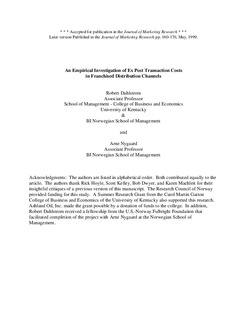| dc.contributor.author | Dahlstrøm, Robert | |
| dc.contributor.author | Nygaard, Arne | |
| dc.date.accessioned | 2009-09-02T11:02:38Z | |
| dc.date.issued | 1999 | |
| dc.identifier.citation | Journal of Marketing Research, 1999, (May), 160-170 | |
| dc.identifier.issn | 0022-2437 | |
| dc.identifier.uri | http://hdl.handle.net/11250/93316 | |
| dc.description | This article was first published in Journal of Marketing Research vol 36: 160-170. | en |
| dc.description.abstract | This study focuses on organizational efforts to constrain ex post transaction costs in interorganizational exchange. The theoretical model frames opportunism as a determinant of transaction costs and implicates cooperation and formalization as control structures that alleviate opportunism. The model also examines whether the proposed theoretical relationships are enduring. Franchisee-franchisor relationships in the Norwegian distribution system of a multinational oil refiner provided the context for analysis. A test of the model using multi-sample data across two time periods indicates that opportunistic behavior consistently increases transaction costs. Furthermore, cooperative interaction curbs bargaining costs and formalization reduces opportunism. Implications for nterorganizational theory and franchising management are discussed. | en |
| dc.format.extent | 162174 bytes | |
| dc.format.mimetype | application/pdf | |
| dc.language.iso | eng | en |
| dc.publisher | The American Marketing Association (AMA) | en |
| dc.title | An Empirical Investigation of Ex Post Transaction Costs | en |
| dc.type | Journal article | en |
| dc.type | Peer reviewed | en |
| dc.source.pagenumber | 160-170 | en |
| dc.source.volume | 36 | en |
| dc.source.journal | Journal of Marketing Research | en |
| dc.source.issue | May | en |
